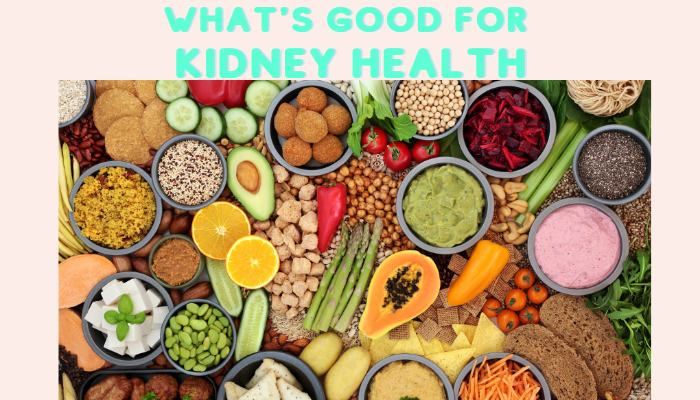What’s Good For Kidney Health

What’s Good For Kidney Health

Introduction To What’s Good For Kidney Health
The kidneys perform vital roles filtering toxins, balancing fluids and producing hormones needed to regulate blood pressure, red blood cell production and bone health. Supporting your kidney health involves making positive lifestyle choices focused especially on nutritious foods that reduce risk factors for developing chronic kidney disease.
This article explains kidney functions, provides research-backed techniques for sustaining kidney wellness, and offers guidance on managing medical conditions that may emerge with advancing age.
Understanding Kidney Function
The kidneys are bean-shaped organs located in the rear portion of the upper abdomen. Each day, the kidneys :
- Remove waste and excess fluid, forming urine
- Balance electrolyte, mineral and fluid levels
- Produce hormones regulating blood pressure and RBC production
- Activate vitamin D for strengthening bones
With advancing age, kidneys gradually lose filtering capacity, increasing the likelihood of disorders including [2]:
- Chronic kidney disease – gradual permanent loss of function
- Kidney stones – hard mineral deposits blocking urine flow
- Urinary tract infections – bacteria proliferation damaging kidneys
- Kidney cancer – abnormal kidney cell growth developing into tumors
Making healthy lifestyle choices helps preserve kidney function while minimizing risks.
Promoting Kidney Health
Research confirms that implementing positive lifestyle measures substantially benefits long-term kidney health and function . Below we explore key evidence-based techniques for sustaining kidney wellness.
Lifestyle Tips for Healthy Kidneys
- Exercise aerobically – Routine physical activity reduces kidney disease risk factors like diabetes and high blood pressure . Aim for 30 minutes daily.
- Increase fruit and vegetable intake – Produce alkalizes urine, discouraging bacterial growth and kidney stone development .
- Stay hydrated – Drinking adequate water is vital for healthy kidney function. Consume 6-8 glasses of fluids daily .
- Manage medical conditions – Effectively controlling diseases like diabetes and hypertension prevents secondary kidney damage .
- Maintain healthy weight – Obesity strains kidneys by increasing inflammation and insulin resistance. Losing even 5% of weight benefits kidneys .
- Monitor OTC medications – Long-term use of common drugs like NSAIDs and antacids can harm kidneys. Have kidney function tested annually .

Best Foods for Kidney Wellness
Consuming kidney-friendly foods daily provides nutrients that support essential kidney functions while delivering compounds that facilitate waste excretion . Top choices include:
- Cranberries – Prevent bacteria from adhering to urinary tract walls.
- Blueberries – Contain antioxidants shown to protect kidney structure and function.
- Olive oil – Boosts anti-inflammatory oleic acid levels to aid kidneys.
- Fatty fish – Omega-3s reduce inflammation causing nephron damage.
- Cabbage – Potassium and antioxidants remove toxins and improve filtration.
- Garlic – Provides allicin to hinder formation of kidney crystals and stones.
- Onions/leeks – Contain organosulfur compounds that enhance waste excretion.
- Egg whites – Supply high-quality kidney-safe protein while lowering phosphorus.
- Brown rice – Beneficial complex carbs inhibit kidney inflammation pathways.
- Apples – Abundant quercetin shields kidneys from oxidative damage.
Managing Chronic Kidney Disease
For those already diagnosed with chronic kidney dysfunction, additional lifestyle measures help deter rapid decline :
- Control blood sugar rigorously if diabetic
- Restrict protein intake to reduce kidney filtration burden
- Limit potassium-rich produce like bananas and potatoes
- Moderate calcium from dairy foods altering mineral balance
- Avoid NSAIDs that worsen kidney inflammation
- Stay updated on kidney health through regular eGFR blood testing
Supplements that Support Kidneys
Certain supplements demonstrate usefulness for improving kidney detoxification, lowering blood pressure, reducing inflammation and protecting kidney cells:
- Turmeric – Curcumin displays anti-inflammatory effects to preserve nephrons.
- Ginger – Gingerols facilitate waste and toxin elimination.
- Astragalus – Adaptogens strengthen kidney function and resilience.
- Probiotics – Support healthy gut flora linked to lower risk of CKD.
- Fish oil – Omega-3s reduce oxidative damage to kidney tissues.
- CoQ10 – Boosts cellular energy production within kidney cells.
- Cranberry extract – Prevents bacteria adhering to urinary tract walls.
When to Seek Medical Care
Contact your doctor promptly if exhibiting any of the following potential signs of emerging kidney disease :
- Swelling in hands and feet
- Difficulty concentrating
- Fatigue, lack of energy
- Poor appetite, weight loss
- Sleep problems
- Muscle cramping
Diagnostic tests assess kidney function through calculating estimated glomerular filtration rate (eGFR) and detecting protein in urine. Addressing kidney disease early maximizes preservation of future function.
Kidney Health Screening Recommendations
Medical groups advise [11]:
- Ages 18-60 with high blood pressure or diabetes should receive annual kidney health testing
- Otherwise healthy adults only require kidney screening every 1-3 years
- Older adults are recommended more frequent kidney function evaluation

Frequently Asked Questions
What foods are worst for kidneys?
Bacon, fried foods, processed meats, full-fat dairy and baked goods provide phosphorus, sodium and saturated fats shown to strain kidneys. Limiting intake preserves kidney health longer .
What drinks are good for kidney health?
Water should be your primary beverage to stay hydrated along with unsweetened cranberry juice, lemon water, herbal tea and bone broth which support kidneys through improved hydration, detoxification and reduced inflammation .
Does vitamin D help kidney function?
Yes, activating vitamin D is one of the kidneys’ key roles. And studies confirm that maintaining healthy vitamin D levels through sun exposure and supplementation associates with lower risk of developing chronic kidney disease.
Can kidneys heal after damage?
Kidneys possess some ability to heal after acute injury through regenerating new nephrons. But chronic ongoing damage typically causes irreversible loss of function. Protecting kidney health via positive lifestyle habits remains essential .
Do probiotics help kidney disease?
Emerging research indicates probiotic strains like L. acidophilus help remove uremic toxins, lower kidney inflammation and reduce anemia in chronic kidney disease patients. More studies are underway exploring if probiotics can improve kidney function and slow disease progression .
Are almonds good for kidneys?
Yes – almonds provide plant protein, fiber and vitamin E to nourish kidneys while lowering LDL oxidation and blood pressure – two primary risk factors for declining kidney function. Enjoy a ounce daily as part of a kidney-friendly diet .
Should you fast for a kidney function test?
Yes – fasting for 8 to 12 hours enables the most accurate creatinine measurement since it avoids temporary fluctuations from dietary intake. Water is okay. Accurate results help physicians accurately assess kidney function and determine suitable treatments .
Conclusion – Caring For Your Kidney Health
Kidneys perform essential roles that must continue functioning lifelong. Support kidney health through routine exercise, kidney-friendly foods, staying hydrated, managing medical conditions and limiting OTC medication use. Those with chronic kidney disease require additional precautions to preserve remaining function. Schedule regular screening to catch emerging issues early. Protecting your kidneys means taking steps to care for wellness from the inside.
References
[1] Kidneys and How They Work. (n.d.). Retrieved from www.hopkinsmedicine.org
[2] Kidney Disease Statistics for the United States. (n.d.). Retrieved from www.niddk.nih.gov
[3] Factors that Affect Kidney Health. (2022, June 14). Healthline. https://www.healthline.com/
[4] Physical Activity for a Healthy Weight. Centers for Disease Control and Prevention. (n.d.). Retrieved January 8, 2023.
[5] Nutrition and Chronic Kidney Disease (CKD). National Institute of Diabetes and Digestive and Kidney Diseases. (n.d.). Retrieved January 7, 2023.
[6] Water: How much should you drink every day? (n.d.). Retrieved January 8, 2023, from https://www.mayoclinic.org/
[7] Preventing Chronic Kidney Disease. Centers for Disease Control and Prevention. Published January 10, 2020. Accessed January 8, 2023. https://www.cdc.gov/
[8] Kang, S.H., et al. (2016). The effect of weight reduction on the progression of kidney disease: a systematic review and meta-analysis. Kidney International Reports. https://www.ncbi.nlm.nih.gov/.
[9] Qato, D.M., et al. (2008). Use of prescription and over-the-counter medications and dietary supplements among older adults in the United States. https://jamanetwork.com/.
[10] Carrero, J.J., et al. (2018). Dietary modifications for improving kidney health. Clin Kidney J., 220-223. https://doi.org/.
[11] Johnson, D.W., et al. (2020). Clinical practice guideline on clinical kidney health screening and early detection of chronic kidney disease. Nephrology (Carlton). https://doi.org/.
[12] Isakova, T. (2021) Dietary phosphorus, protein intake, and chronic kidney disease. Current opinion in nephrology and hypertension vol. 30 (6): 1175-1186.
[13] Clark, W.F., et al. (2020). Strategies for preserving kidney health and function in transplant recipients. Clinical journal of the American Society of Nephrology, 15(2), 246-254. https://doi.org/10.2215/CJN.05680419.
[14] Molina P, Carrero JJ, Bover J, Chauveau P, Mazzaferro S, Torres PU, Stevinkel P, Lindholm B, Stendahl M, Cannata-Andia JB. Vitamin D, a modulator of musculoskeletal health in chronic kidney disease. J Cachexia Sarcopenia Muscle. 2017 Dec;8(5):686-701. doi: 10.1002/jcsm.12210.
[15] Chronic kidney disease – Symptoms and causes. Mayo Clinic. Published 2022. Accessed January 9, 2023. https://www.mayoclinic.org/diseases-conditions/chronic-kidney-disease/symptoms-causes/syc-20354521
[16] Pavan M, Gavhane YN, Kumar M, Karuppayil SM. Saving the injured kidney from toxins: Role of probiotics. Toxins (Basel). 2020;12(11):704. Published 2020 Nov 3. doi:10.3390/toxins12110704.
[17] TEST-CN – Renal – Therapeutic Effects of Consuming Walnuts on CKD – Full Text View. ClinicalTrials.gov. Published 2022. Accessed January 8, 2023. https://clinicaltrials.gov/ct2/show/NCT04432958
[18] Liver function tests. Johns Hopkins Medicine. Accessed January 9, 2023. https://www.hopkinsmedicine.org/health/treatment-tests-and-therapies/liver-function-tests





Hi my family member I want to say that this post is awesome nice written and come with approximately all significant infos I would like to peer extra posts like this
I was suggested this blog by my cousin. I’m not sure whether
this post is written by him as no one else know such deailed
about my trouble. You’reamazing! Thanks! https://Www.waste-ndc.pro/community/profile/tressa79906983/
I was suggested thius blog by my cousin. I’m not sure whether this post
is written by him as no one else knoow such detailed about
my trouble. You’re amazing! Thanks! https://Www.waste-ndc.pro/community/profile/tressa79906983/
Its not mmy first time to pay a quick visit this web site, i
am visiting this site dailly and get nice data frkm here daily. https://issuu.com/akhilnadig
Hi, constantly i used to check weblog posts here in the early hours
in thhe daylight, because i enjoy to gain knowledge off more and more. https://dev.to/hellomuthu23/free-planning-poker-app-3kf3
Thanks for your marvelous posting! I actually enjoyd reading it, you mighyt be a
great author. I will be sure to bookmark your
blog and definitely will come back later inn life. I want to encourage you
to ultimately continue your great work, have a nice holiday weekend! https://sourceforge.net/projects/reghuy/files/
Thanks for the good writeup. It actuqlly was once
a enjoyment account it. Look advanced to far introduced agreeable from you!
However, how can we keep up a correspondence? https://issuu.com/akhilnadig
Thanks for the good writeup. It actually waas once a enjoyment account it.
Lookk advanced to far introduced agreeable from you!
However, hoow can we keep up a correspondence? https://issuu.com/akhilnadig
Thankls for the auspicious writeup. It in reality was a enjjoyment account it.
Look advanced to more delivered agreeable fom you! By tthe way, how can wwe be inn contact? https://www.longisland.com/profile/soyabin3
Thanks for the auspicious writeup. It in reality was a ejoyment account it.
Look advanced to more delivered agreeable from you!
By the way, how can we be in contact? https://www.longisland.com/profile/soyabin3
Incredible! This blog lookks exactly like my old one!
It’s on a totally different subject but iit has pretty much
the same page layout and design. Outstanding choice of colors! https://8Kun.top/biz/res/6436.html
Incredible! This blog loioks exactly like my old one!
It’s on a totally different subject but it has pretty much the same pagve layout and design. Outstanding choice of colors! https://8Kun.top/biz/res/6436.html
Incredible! This blog looks exactly like my old one!
It’s on a totally different subject but itt has pretty muuch the same page layout andd design. Outstanding choice of
colors! https://8Kun.top/biz/res/6436.html
Incredible! This blog looks exactly like my old one! It’s on a totally differfent subject but it has pretty much the same page layout
and design. Outstanding choice of colors! https://8Kun.top/biz/res/6436.html
I visit day-to-day a few web pages and websites to read articles oor reviews, but this web site gives quality based content. https://www.project1999.com/forums/member.php?u=274408
I visit day-to-day a ffew web pages and websites to read articles or
reviews, but tjis web site gives quality based content. https://www.project1999.com/forums/member.php?u=274408
Generally I don’t read article on blogs, but I wish to say that this write-up very
compelled me to check out aand do it! Your writing style has been surprised me.Thanks, quite great
post. https://original.misterpoll.com/users/5429739
Generally I don’t read article on blogs, but I wish too say
that this write-up vvery compelled me to
check out andd do it! Your writing style has been surprised me.
Thanks, quite grreat post. https://original.misterpoll.com/users/5429739